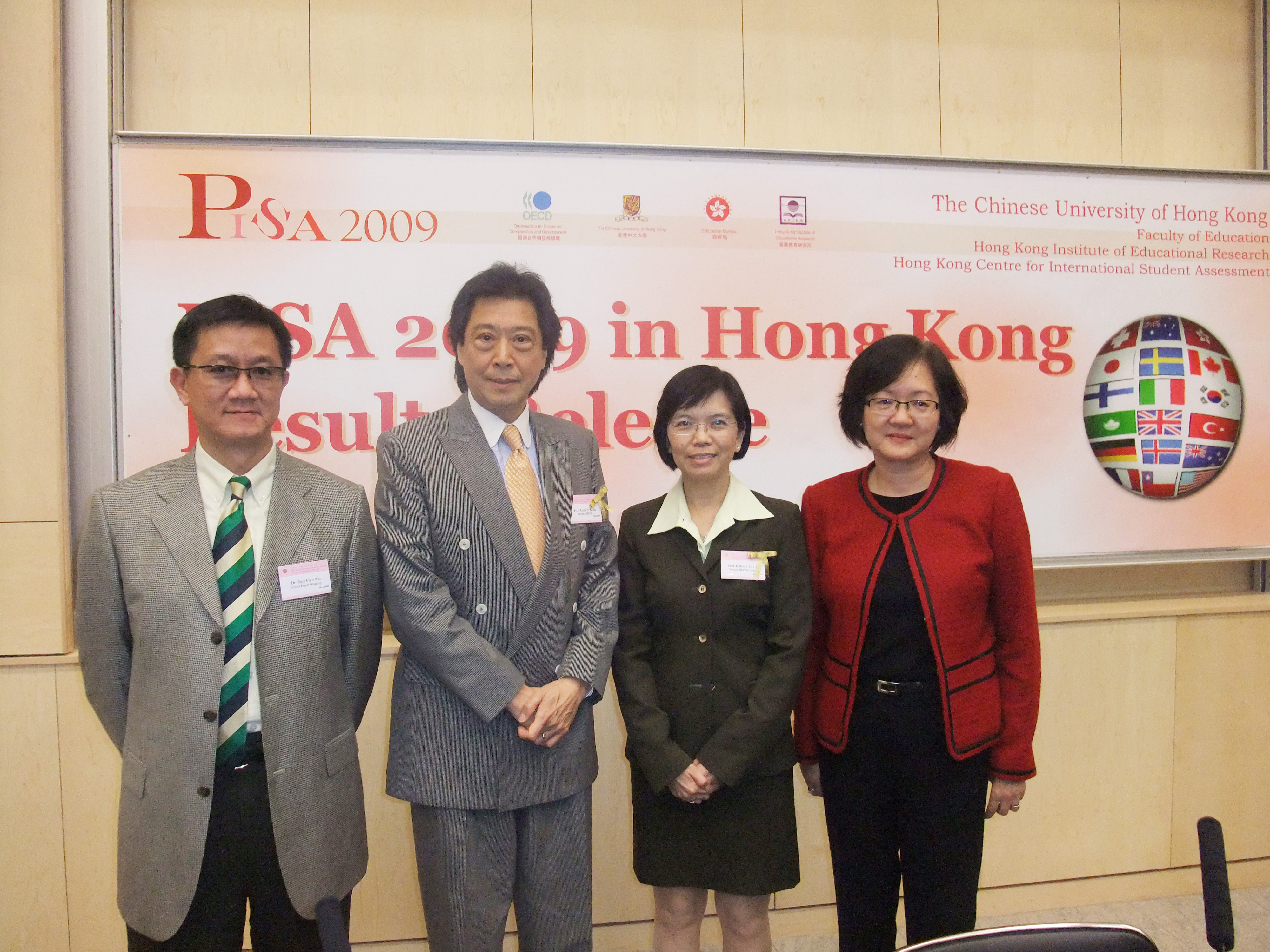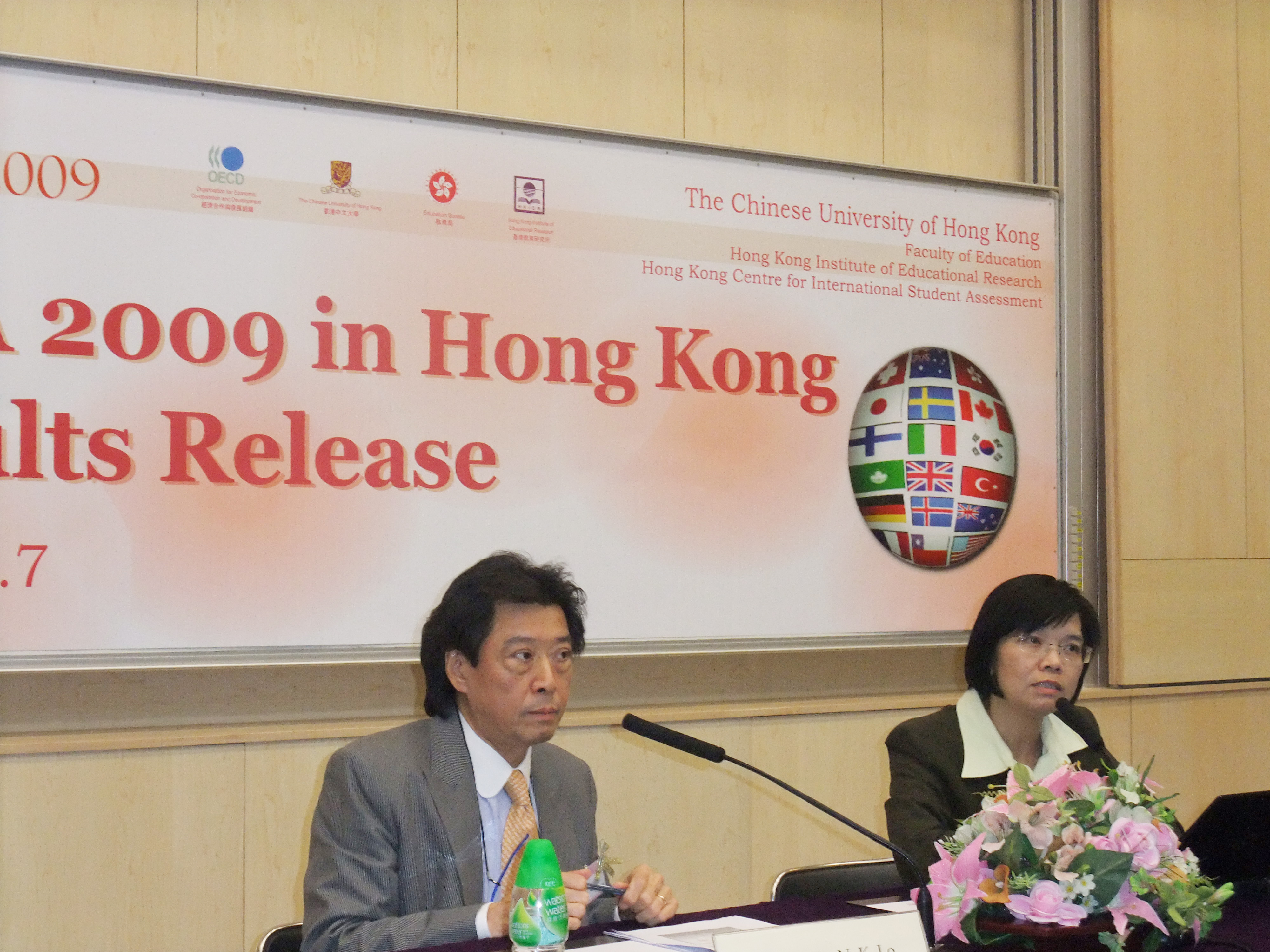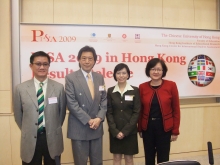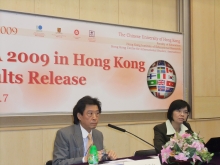CUHK
News Centre
CUHK Releases the Results of Programme for International Student Assessment
The Hong Kong Centre for International Student Assessment of the Institute of Educational Research at The Chinese University of Hong Kong (CUHK) released the survey results of Programme for International Student Assessment (PISA 2009) today (7 December). During April to June 2009, about 5,000 students from 151 schools including government, aided and independent schools were randomly selected for the assessment of student performance in reading, mathematics and science.
The survey reveals that Hong Kong 15-year-old students again stand in the top tier among 65 countries and regions. They rank fourth in reading and third in both mathematics and science (Figure 1 and Appendix 1). Regarding equity in education, the difference in performance between students of different socio-economic background changes littlewhen compared with that in 2002, the first PISA survey in Hong Kong. The difference in student performance between schools is getting smaller. The impact of socio-economic status (SES) aggregated at school level is considerably reduced. Taking together, these changes suggest that the basic education of Hong Kong is heading toward a quality education with equality. However, it is found that the within-school difference of student performance has increased significantly (Figure 2), suggesting that the academic ability of students within the school is becoming more diverse. As such, how secondary school teachers should equip themselves, and what support measures the education authority should provide schools in order to take care of the widened learning difference of the students in schools would be the timely agenda.
Equality in education in terms of how students’ SES, gender, and immigrant status affect their performance in schools is examined. It is found that the impact of students’ SES including occupation and education level of their parents has relatively small impact on their performance (Figure 3 and Appendix 2). Yet significant gender difference is evident in the performance of both mathematics and reading. Boys outperform girls by 14 points in mathematics and girls outperform boys by 33 points in reading (Figure 4), both differences are statistically significant. Also, the performance of immigrant students who were born outside Hong Kong is significantly poorer than that of local-born students, the difference is up to 30 to 40 points (Figure 5).
Various student and parent factors that might have impact on students’ literacy performance are also examined. Results show that students’ reading performance is correlated with students’ engagement in reading. Engagement in reading refers to three aspects: reading enjoyment, reading diversity, and reading online. Findings in PISA 2009 show that Hong Kong 15-year-olds enjoy reading significantly more compared with their counterparts in the 2002 survey (Figure 6). Moreover, students who enjoy reading tend to have better performance in reading. Regarding reading diversity, while the 2009 cohort read fictions, non-fictions and newspapers more than their counterparts in 2002, they also read less magazines and comics. Those who read fictions, non-fictions and newspapers more are found to perform better than those who do less. In contrast, frequent readers of magazines and comics perform poorer than those who read less. Regarding online reading activities, Hong Kong students generally engage in more online reading than students of other participating countries apart from two particular types, namely, discussion forum and email. Among the three factors of engagement in reading, reading for enjoyment is the most significant factor impacting on reading performance, whereas reading more diversely or engaging in more online reading may not facilitate high reading performance on the part of the student (Figure 7).
Regarding parental factors, parents’ perception of school quality is found to be correlated with their children’s reading performance. For parents who are more satisfied with their children’s school, the students tend to perform better. Parents’ involvement in the child’s education at home also has a positive impact on the latter’s learning. If the parent interacts more with the child while the latter is learning at home (e.g. discussing with the child about current affairs, movies or television programmes, books or school life), the child tends to do better in reading. However, parents’ involvement in the school such as to act as parent volunteers or to attend parental programmes is found to be negatively correlated with students’ performance. One possible explanation of this negative relationship could be that at the stage of secondary education, parents’ contact with or involvement in the school’s activities are quite often initiated by the students’ behavioural or academic problems. In other words, parents’ involvement in the school is largely problem-oriented. This undesirable condition needs to be further explored for improvement (Figure 8).
The survey has also collected data concerning other educational issues such as teaching and learning in the classroom, parents’ investment of resources, and the medium of instruction. These will be further studied and reported.
Organised by the Organisation for Economic Co-operation and Development (OECD), PISA compares and evaluates the effectiveness of education systems by assessing how well 15-year-olds approaching the end of compulsory education have acquired the knowledge and skills essential for participation in society. The assessment is conducted every three years.
From left: Dr. Tong Choi-wai, School Development Officer, Quality School Improvement Project, Hong Kong Institute of Educational Research, CUHK; Prof. Lo Nai-kwai Leslie, Dean, Faculty of Education and Director, Hong Kong Institute of Educational Research, CUHK; Prof. Ho Sui-chu Esthor, Director, HKPISA Centre, CUHK; and Prof. Chun Ka-wai Cecilia, Associate Professor, Department of Curriculum and Instruction, CUHK





